

Why Some Schools Are Selling All Their iPads. For an entire school year Hillsborough, New Jersey, educators undertook an experiment, asking: Is the iPad really the best device for interactive learning?
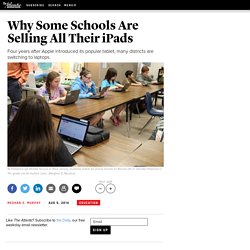
It’s a question that has been on many minds since 2010, when Apple released the iPad and schools began experimenting with it. The devices came along at a time when many school reformers were advocating to replace textbooks with online curricula and add creative apps to lessons. Some teachers welcomed the shift, which allowed their students to replace old poster-board presentations with narrated screencasts and review teacher-produced video lessons at any time. Four years later, however, it's still unclear whether the iPad is the device best suited to the classroom. Meanwhile, the cost of equipment is going down, software is improving, and state policies are driving expectations for technology access. Advent of Google means we must rethink our approach to education.
Would a person with good handwriting, spelling and grammar and instant recall of multiplication tables be considered a better candidate for a job than, say, one who knows how to configure a peer-to-peer network of devices, set up an organisation-wide Google calendar and find out where the most reliable sources of venture capital are, I wonder?
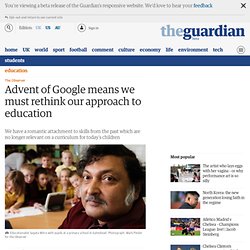
The former set of skills are taught in schools, the latter are not. We have a romantic attachment to skills from the past. Longhand multiplication of numbers using paper and pencil is considered a worthy intellectual achievement. Using a mobile phone to multiply is not. Why Mobile Learning Is Inevitable. This may sound like a lofty title, but it’s not wrong. There’s an impressive presentation making the rounds dubbed “Mobile is eating the World” by Benedict Evans. In the presentation, Evans shows some staggering charts, interesting factoids, and all the other statistics you’d expect with a title so grand. It makes me think about mobile learning, mobile browsing, and mobile everything. But the real story here is about education.
It’s about how we’re all going to be learning in the next few years and generations according to the data in the presentation below. Mobile learning is not only on the rise, it’s inevitable. As you can see in the presentation below (there’s just 24 slides, pretty easy to scroll through and worth it!) Word Processing In Google Docs? 5 Important Tips To Keep In Mind.
For the majority of my life, Microsoft Word was the word processing tool to use if you were going to do any serious work.
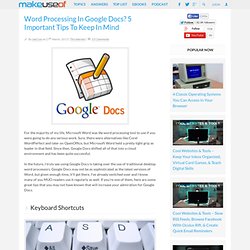
Sure, there were alternatives like Corel WordPerfect and later on OpenOffice, but Microsoft Word held a pretty tight grip as leader in that field. Since then, Google Docs shifted all of that into a cloud environment and has been quite successful. In the future, I truly see using Google Docs is taking over the use of traditional desktop word processors. Google Docs may not be as sophisticated as the latest versions of Word, but given enough time, it’ll get there. I’ve already switched over and I know many of you MUO readers use it regularly as well. Keyboard Shortcuts Most of the time, you can’t really use keyboard shortcuts on webpages because those shortcuts are often intercepted by the browser itself. Here are some of my favorites features of using Google docs that I make use of all the time: Ctrl + Alt + C: Copies the formatting on the currently selected text.
Near Field Communication: What is Near Field Communication? Windows 8 Tablets: The most successful tablets ever. Soon, you and users around the world will be able to purchase your very own Windows 8 Tablet computers.
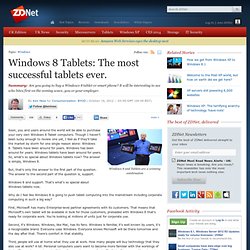
Though I haven't been lucky enough to review one yet, I feel as if they'll take the market by storm for one single reason alone: Windows 8. Tablets have been around for years. Windows has been around for years. Windows tablets have been around for years. So, what's so special about Windows tablets now? But, that's only the answer to the first part of the question. Windows 8 and support. Why do I feel like Windows 8 is going to push tablet computing into the mainstream including corporate computing in such a big way? First, Microsoft has many Enterprise-level partner agreements with its customers. Second, it's Windows. Third, people will use at home what they use at work. Fourth, a lot of consumers will buy into Windows 8 tablets because of its more tablet-friendly interface.
BetaNews. Microsoft needs to harness and capitalize on some of the pent up anticipation that is surrounding roughly the next 5 months of its product lineup.
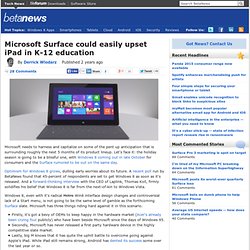
Let's face it: the holiday season is going to be a blissful one, with Windows 8 coming out in late October for consumers and the Surface rumored to be out on the same day. Optimism for Windows 8 grows, dulling early worries about its future. A recent poll run by BetaNews found that 45-percent of respondents are set to get Windows 8 as soon as it's released. And a forward-thinking interview with the CEO of Laplink, Thomas Koll, firmly solidifies his belief that Windows 8 is far from the next-of-kin to Windows Vista.